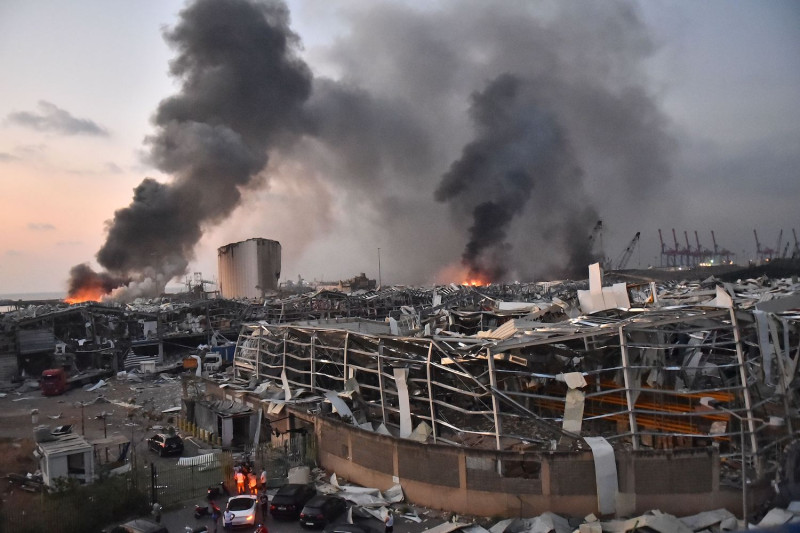Over 3700 people injured, 75 others killed in massive blast in Beirut

The blast rocked the Port of Beirut at around 6:10 p.m. local time (16.10 GMT), shaking buildings all over the city while causing massive casualties and damages. The number of casualties were expected to rise as the search and counting continued.
What we know:
The blast appears to have been centered on the city’s port area. The causes of the blast remained unknown and an investigation is under way to find what had exactly triggered the explosion. But Lebanese Interior Minister Mohammad Fahmi said that the explosive chemicals stored at Port of Beirut may have caused the explosion.
Thousands of people sought treatment in nearby hospitals, which were struggling to cope with the huge number of casualties.
Lebanese President Michel Aoun said a state of emergency should be declared in Beirut for two weeks following the massive explosion on Tuesday, and he called for an emergency cabinet meeting on Wednesday.
Aoun, in remarks published on the Presidency Twitter account, said it was “unacceptable” that 2,750 tonnes of ammonium nitrate was stored in a warehouse for six years without safety measures and vowed that those responsible would face the “harshest punishments”.
The U.S. Embassy in Beirut released a statement advising that people wear masks and stay indoors, following “reports of toxic gases released in the explosion.”
What is ammonium nitrate?
Ammonium nitrate has a number of different uses, but the two most common are as an agricultural fertilizer and as an explosive.
Ammonium nitrate does not burn. However, it will support and increase the rate of combustion in the presence of flammable or combustible materials even in the absence of oxygen.
Prime Minister Diab said in the statement it was “unacceptable” that so much explosive material was stored in a warehouse “without taking preventive measures while endangering the safety of citizens.”
World offers support to Lebanon:
Lebanese Prime Minister Hassan Diab urged friendly countries to help Lebanon overcome the repercussions of the disastrous explosions.
UN chief Antonio Guterres expressed his deepest condolences following the “horrific explosions in Beirut” which he said had also injured some United Nations personnel.
U.S. President Donald Trump said the U.S. “stands ready to assist Lebanon” and that he had met with some U.S. generals who feel the blast was not “some kind of a manufacturing explosion type of event.”
President Vladimir Putin said that“Russia shares the grief of the Lebanese people,” according to a Kremlin statement.
French Foreign Minister Jean-Yves Le Drian said the country was”ready to provide assistance according to the needs expressed by the Lebanese authorities.”
Canadian Prime Minister Justin Trudeau wrote on social media to say “we think of all those who were injured in this tragic explosion, as well as those who are trying to find a friend or family member or who have lost a loved one. We’re ready to help you.”
In the region, Gulf nations were among the first to react, with Qatar promising to send field hospitals to support the medical response.
Qatar’s ruler Emir Sheikh Tamim bin Hamad Al-Thani wished “a speedy recovery for the injured,” while the United Arab Emirates’ Vice President and ruler of Dubai, Sheikh Mohammed bin Rashid Al-Maktoum, tweeted “our condolences to our beloved people in Lebanon.”
Kuwait said it would also send emergency medical aid. Egypt expressed “deep concern” at the destruction, and Arab League chief Ahmed Aboulgheit offered condolences, stressing “the importance of finding the truth about the explosions.”
Turkish President Recep Tayyip Erdogan has also said that Ankara will do all necessary steps to send aids and help to Beirut, especially to support the health sector at this point.
How to submit an Op-Ed: Libyan Express accepts opinion articles on a wide range of topics. Submissions may be sent to oped@libyanexpress.com. Please include ‘Op-Ed’ in the subject line.
- Haftar to fly to the US with family, pretending it’s a Libyan official visit - September 13, 2021
- Haftar hires ex-Clinton aide, ex-Republican leader to lobby Washington for Libya elections’ run - September 09, 2021
- Al-Saadi Gaddafi, late dictator’s son, released from Libyan prison - September 06, 2021


